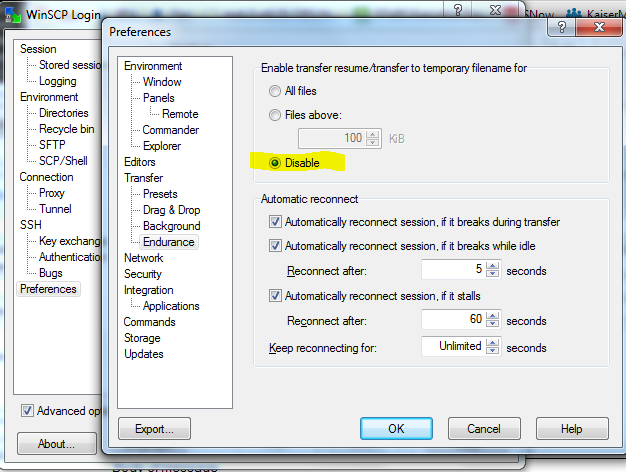docs
https://access.redhat.com/site/documentation/en-US/Red_Hat_Storage/
Installation
mount -o loop /home/pkg/RHSS-2.1-20131122.0-RHS-x86_64-DVD1.iso /mnt/RHS
Redhat storage version:
redhat-storage-server-2.1.1.0-6.el6rhs.noarch
Nodes:
11.16.153.226 pgvr1126 RHS POC PG 1/23/2014
11.16.153.227 pgvr1127 RHS POC PG 1/23/2014
11.16.153.228 pgvr1128 RHS POC PG 1/23/2014
11.16.153.229 pgvr1129 RHS POC PG 1/23/2014
XFS - Format the back-end file system using XFS for glusterFS bricks. XFS can journal
metadata, resulting in faster crash recovery.
The XFS file system can also be defragmented and expanded while mounted and active.
3 different installing RHS: ISO, PXE server, Red Hat Satellite Server
Created a VM under RHS POC with 8GB/16G RAM
booted with RHS iso RHSS-2.1-20131122.0-RHS-x86_64-DVD1.iso
---Install and upgrade doesn't work because of drivers issues
---Install with basic driver (second option)
Starting and Stopping the glusterd service
# service glusterd start/stop
Node 1
[root@pgvr1126 ~]# cat /etc/redhat-release
Red Hat Enterprise Linux Server release 6.4 (Santiago)
[root@pgvr1126 ~]# pvcreate /dev/sdb
Physical volume "/dev/sdb" successfully created
[root@pgvr1126 ~]# vgcreate rhsvg01 /dev/sdb
Volume group "rhsvg01" successfully created
[root@pgvr1126 ~]# lvcreate -n rhslv01 -L 9G rhsvg01
Logical volume "rhslv01" created
[root@pgvr1126 ~]# mkfs.xfs -i size=512 /dev/mapper/rhsvg01-rhslv01
meta-data=/dev/mapper/rhsvg01-rhslv01 isize=512 agcount=4, agsize=589824 blks
= sectsz=512 attr=2, projid32bit=0 data = bsize=4096 blocks=2359296, imaxpct=25
= sunit=0 swidth=0 blks naming =version 2 bsize=4096 ascii-ci=0
log =internal log bsize=4096 blocks=2560, version=2 = sectsz=512 sunit=0 blks, lazy-count=1 realtime =none extsz=4096 blocks=0, rtextents=0
[root@pgvr1126 ~]# pvs
PV VG Fmt Attr PSize PFree
/dev/sda2 vg_pgvr1126 lvm2 a-- 15.51g 0
/dev/sdb rhsvg01 lvm2 a-- 10.00g 1020.00m
[root@pgvr1126 ~]# mkdir -p /gluster/xfs
[root@pgvr1126 ~]# vi /etc/fstab
/dev/mapper/rhsvg01-rhslv01 /gluster/xfs xfs defaults,inode64,noatime 0 0
[root@pgvr1126 ~]# mount -a
[root@pgvr1126 ~]# df -h
Filesystem Size Used Avail Use% Mounted on
/dev/mapper/vg_pgvr1126-lv_root
7.6G 1.8G 5.5G 25% /
tmpfs 4.0G 0 4.0G 0% /dev/shm
/dev/sda1 485M 33M 427M 8% /boot
/dev/mapper/rhsvg01-rhslv01
9.0G 33M 9.0G 1% /gluster/xfs
[root@pgvr1126 ~]# vi /etc/hosts
11.16.153.226 pgvr1126
11.16.153.227 pgvr1127
11.16.153.228 pgvr1128
11.16.153.229 pgvr1129
Gluster FS commands:
[root@pgvr1126 ~]# gluster peer probe pgvr1127
peer probe: success.
[root@pgvr1126 ~]# gluster peer status
Number of Peers: 1
Hostname: pgvr1127
Uuid: f216c593-e358-4842-8c8e-c51e3152af63
State: Peer in Cluster (Connected)
[root@pgvr1126 ~]# gluster volume create rhs01 replica 2 pgvr1126:/gluster/xfs/rhs01 md
volume create: rhs01: success: please start the volume to access data
[root@pgvr1126 ~]# gluster volume start rhs01
volume start: rhs01: success
[root@pgvr1126 ~]# df -h
Filesystem Size Used Avail Use% Mounted on
/dev/mapper/vg_pgvr1126-lv_root
7.6G 1.8G 5.5G 25% /
tmpfs 4.0G 0 4.0G 0% /dev/shm
/dev/sda1 485M 33M 427M 8% /boot
/dev/mapper/rhsvg01-rhslv01
9.0G 33M 9.0G 1% /gluster/xfs
[root@pgvr1126 ~]# gluster volume info
Volume Name: rhs01
Type: Replicate
Volume ID: 13a73b40-dfce-4b79-b047-c7bffaa2a879
Status: Started
Number of Bricks: 1 x 2 = 2
Transport-type: tcp
Bricks:
Brick1: pgvr1126:/gluster/xfs/rhs01
Brick2: pgvr1127:/gluster/xfs/rhs01
[root@pgvr1126 ~]# cd /gluster/xfs/rhs01
[root@pgvr1126 rhs01]# ls -l
total 0
drwxr-xr-x 2 root root 6 Feb 11 17:11 pankaj
Node 2
[root@pgvr1127 ~]# pvcreate /dev/sdb
Physical volume "/dev/sdb" successfully created
[root@pgvr1127 ~]# vgcreate rhsvg01 /dev/sdb
Volume group "rhsvg01" successfully created
[root@pgvr1127 ~]# lvcreate -n rhslv01 -L 9G rhsvg01
Logical volume "rhslv01" created
[root@pgvr1127 ~]# mkdir -p /gluster/xfs
[root@pgvr1127 ~]# mkfs.xfs -i size=512 /dev/mapper/rhsvg01-rhslv01
meta-data=/dev/mapper/rhsvg01-rhslv01 isize=512 agcount=4, agsize=589824 blks
= sectsz=512 attr=2, projid32bit=0
data = bsize=4096 blocks=2359296, imaxpct=25
= sunit=0 swidth=0 blks
naming =version 2 bsize=4096 ascii-ci=0
log =internal log bsize=4096 blocks=2560, version=2
= sectsz=512 sunit=0 blks, lazy-count=1
realtime =none extsz=4096 blocks=0, rtextents=0
[root@pgvr1127 ~]# vi /etc/fstab
[root@pgvr1127 ~]# mount -a
[root@pgvr1127 ~]# df -h
Filesystem Size Used Avail Use% Mounted on
/dev/mapper/vg_pgvr1127-lv_root
12G 1.8G 9.1G 17% /
tmpfs 1004M 0 1004M 0% /dev/shm
/dev/sda1 485M 33M 427M 8% /boot
/dev/mapper/rhsvg01-rhslv01
9.0G 33M 9.0G 1% /gluster/xfs
[root@pgvr1127 ~]# vi /etc/hosts
[root@pgvr1127 ~]# gluster peer probe pgvr1126
peer probe: success.
[root@pgvr1127 ~]# gluster peer status
Number of Peers: 1
Hostname: pgvr1126
Uuid: 29a69702-0ffd-42f7-9105-474098d7be30
State: Peer in Cluster (Connected)
[root@pgvr1127 ~]# df -h
Filesystem Size Used Avail Use% Mounted on
/dev/mapper/vg_pgvr1127-lv_root
12G 1.8G 9.1G 17% /
tmpfs 1004M 0 1004M 0% /dev/shm
/dev/sda1 485M 33M 427M 8% /boot
/dev/mapper/rhsvg01-rhslv01
9.0G 33M 9.0G 1% /gluster/xfs

